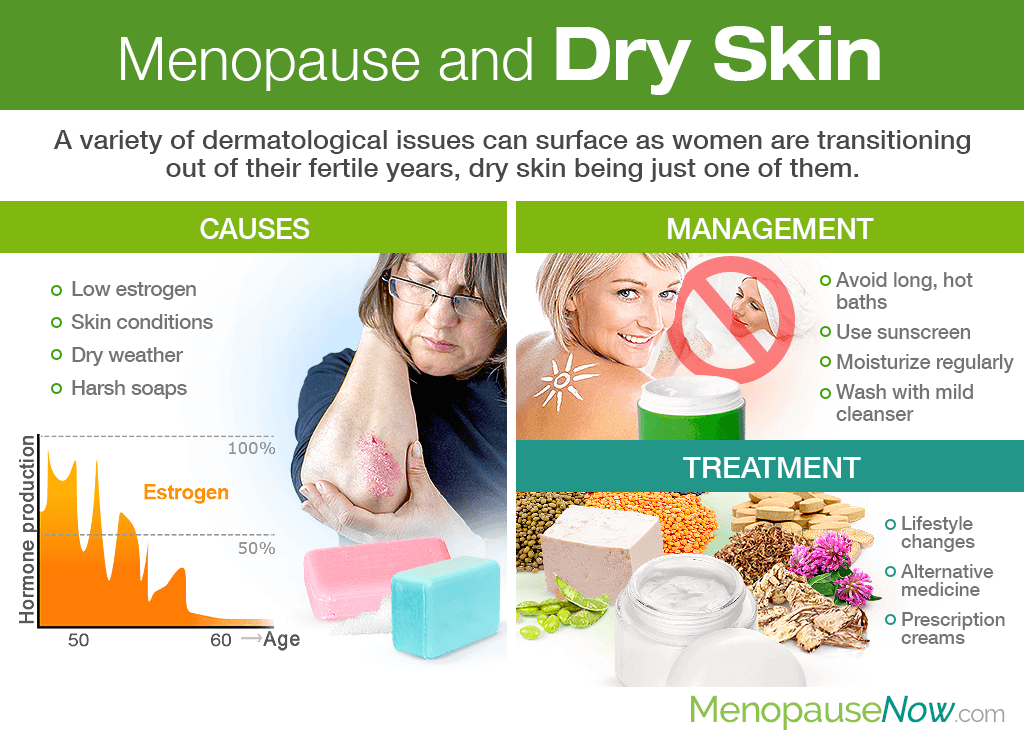As women are passing through menopause, a variety of skin problems can pop up, including itchy skin, dry skin, and more. Luckily, women do not have to grin and bear it for the rest of their lives. Continue reading to learn all about menopause and dry skin, including the symptom's causes, viable management options, and treatments to have supple skin once and for all.
Causes of Menopause Dry Skin

Low estrogen and dry skin during menopause go hand in hand. As women are about to end their reproductive years, drastic fluctuations occur of the reproductive hormone, compromising collagen production. As a result, skin becomes less elastic and less moisturized.
Nevertheless, dry skin during menopause can also be due to other factors, such as:
- Skin conditions, like dermatitis or psoriasis
- Hot baths and showers
- Heat
- Dry weather, such as during wintertime
- Harsh soaps and detergents
Manage Dry Skin during Menopause

Tackling dry skin due to menopause can be as easy as instilling some simple techniques in day-to-day life, such as:
Avoiding long, hot showers and baths. Hot water can pull moisture from the skin and dry it out further. Opt for lukewarm water, and limit bath times to once a day for 10 minutes or less.
Using sunscreen. When out and about, it is important to apply sunscreen as it will help stave off sun damage, keeping skin healthier.
Washing with a mild cleanser. Because harsh soaps can induce or aggravate already dry skin, menopausal women are encouraged to avoid the stripping chemicals.
Applying moisturizer regularly. To trap the moisture left in your skin, apply moisturizer after washing up. Those with hyaluronic acid or glycerin can be especially helpful.
Turning on a humidifier. This can be especially important during wintertime, a time when dry air runs rampant in and outside of the house.
While these measures will temporarily relieve dry skin, they will not bring long-lasting relief, thus leading women to look for treatment options.
Treat Dry Skin Due to Menopause

Treating dry skin due to hormonal imbalance starts principally with instilling natural and effective dry and itchy skin treatments that revolve around lifestyle changes alongside the use of alternative medicine to promote optimal endocrine health.
Healthy Diet
Women who are lacking estrogen should add ample amounts of phytoestrogens, plant-based estrogens, into their diet, effectively filling a hormonal gap caused by the cessation of ovarian function. They can be found in legumes, nuts, seeds, soy products, and more.
Lifestyle Changes
Moreover, they should pair this diet adjustment with wholesome habits - many of which are aforementioned in the management section - and addiction control of alcohol, caffeine, and poor sleeping patterns, among others, which stress bodily functions.
Alternative Medicine
For optimal results, implement the use of alternative medicines like phytoestrogenic herbal supplements or hormone-regulating supplements, both of which work with the endocrine system for hormonal balance, yet in distinct manners.
Phytoestrogenic herbal supplements, like dong quai or red clover, contain potent phytoestrogens that are stronger than those found in foods alone, directly combatting an estrogen deficiency that may be at fault for menopause dry skin. Although, it is advised to use them short-term as the introduction of exogenous hormones into the body can cause it to become less capable of producing its own.
Likewise, hormone-regulating supplements, such as Macafem, nourish the endocrine system glands to encourage the body to produce more of its own natural hormones. This brings women relief not only from dry skin, but also hot flashes, night sweats, vaginal dryness, and other menopause symptoms. They are safer for long-term use as they do not contain outside hormones.
Women who are not seeing improvements or suffering from dry skin during menopause due to other causes may speak with a dermatologist to create a personalized treatment plan. He or she may suggest prescription creams and ointments as well as other treatments alongside homecare.
Key Takeaways
In summary, perimenopause dry skin is mainly due to low estrogen levels that occur as a result of decreased ovarian functions, yet it can also be caused by hot baths, heat, dry weather, and skin conditions, among others. Managing the symptom includes methods such as using sunscreen, applying moisturizer regularly, and washing with a mild cleanser, yet long-term relief can be found by treating the underlying cause, which is commonly hormonal imbalance. By implementing lifestyle changes alongside the use of alternative medicine, dry skin during menopause can be tackled one day at a time.
Sources
- American Academy of Dermatology. (n.d.). Caring for your skin in menopause. Retrieved July 24, 2019, from https://www.aad.org/public/skin-hair-nails/skin-care/skin-care-during-menopause
- Healthy Women. (2018). Dry Skin and Menopause. Retrieved July 24, 2019, from https://www.healthywomen.org/content/blog-entry/dry-skin-and-menopause
- Mayo Clinic. (2018). Dry skin: Symptoms & causes | Diagnosis & treatment. Retrieved July 24, 2019, from https://www.mayoclinic.org/diseases-conditions/dry-skin/symptoms-causes/syc-20353885 | https://www.mayoclinic.org/diseases-conditions/dry-skin/diagnosis-treatment/drc-20353891

